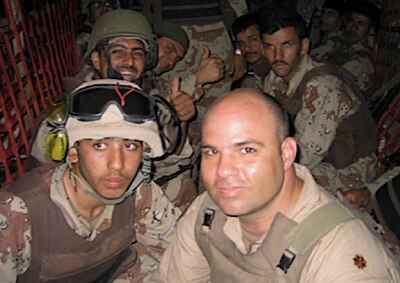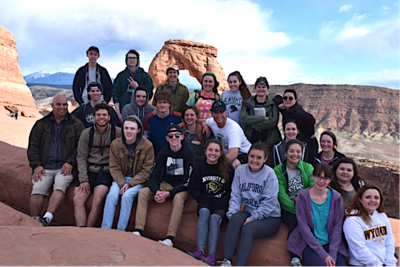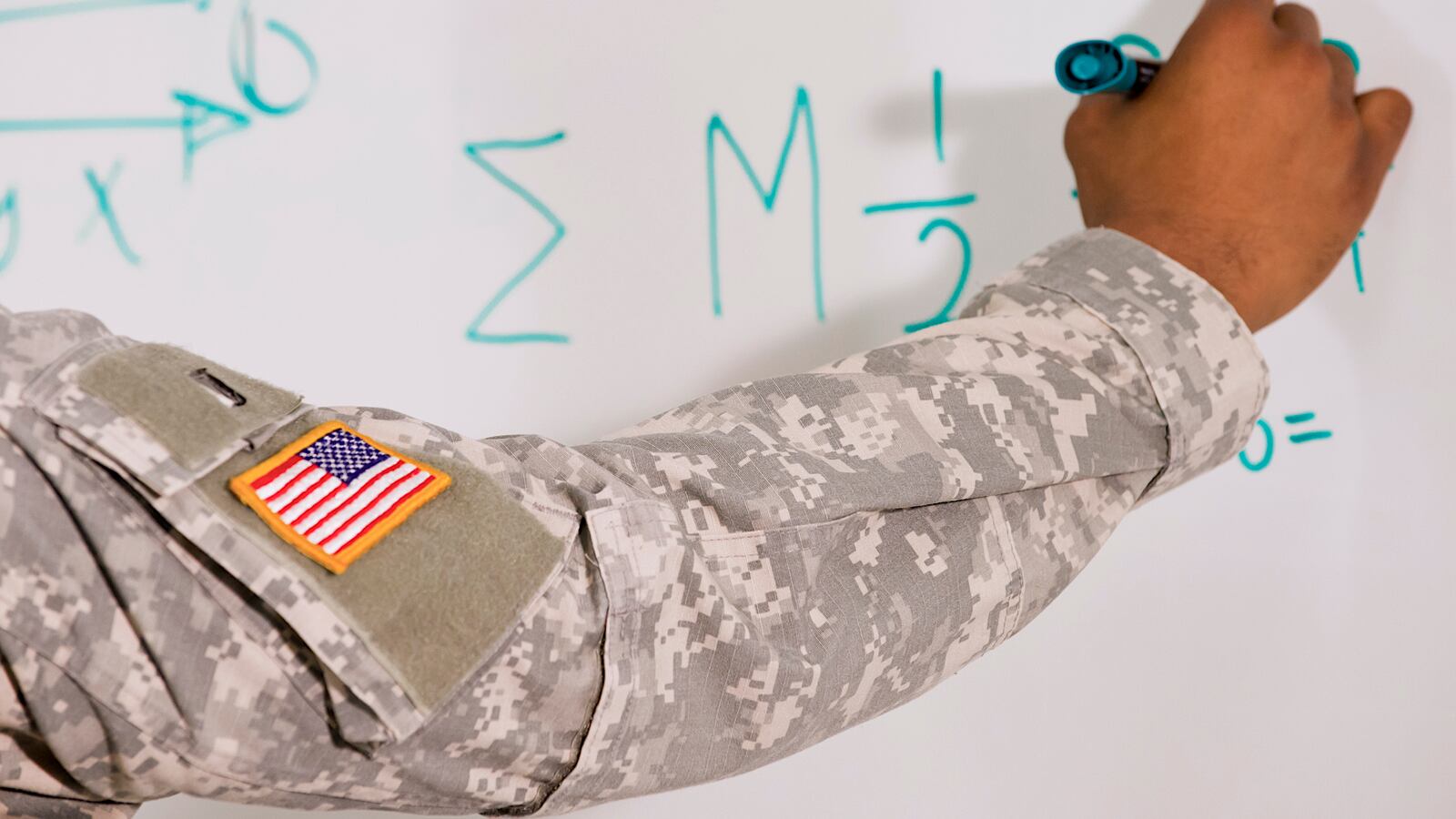Here, in a feature we call How I Teach, we ask educators who’ve been recognized for their work how they approach their jobs. You can see other pieces in the series here.
Daniel Ganoza spent years in the U.S. Air Force before becoming a science teacher at Woodland Park High School west of Colorado Springs. Despite the career switch, he found the military mindset useful in the classroom.
“In the Air Force everyone is valuable to the mission,” he said. “You have no choice in training them the best you can. The mission depends on it and your reputation as a leader depends on your folks knowing their job.”
Ganoza, who won the 2018 Secondary Excellence in Teaching award from the Colorado Association of Science Teachers, talked about how the military mentality motivates students, why environmental science is so important for the current generation, and how vaping and marijuana are affecting his school.
This interview has been condensed and lightly edited.
Was there a moment when you decided to become a teacher?

I had selfish reasons for wanting to be a teacher. When I was in the Air Force I had been away from home so much. My oldest two daughters were born and graduated high school while I was still in the military and I’m afraid I missed much of their growing up.
But my youngest child, my son, was starting high school as I was set to leave the military. What a better way for me to try to connect with my son than to be a teacher at his school, to have him and his friends in class, and to coach their sports teams? And it worked. For my first four years of teaching my son was a student in my school. He graduated last year.
How has your experience in the Air Force shaped your approach to teaching?
Everyone in the Air Force was necessary to complete the mission and that is the same mindset I try to bring to the classroom. In the military, every person had value and their success influenced your success. If they failed, it made things harder on the whole organization.
Unfortunately, some kids fail my class and some kids drop out of school. But if I treat my students as if they are one of my troops in the military — if they feel like they are important to me and that I need them to do well, if they feel like my success depends on their success, if they feel like there is something unique and special about them that makes them valuable to me — then maybe for some kids that’s the difference it takes.
How do you get to know your students?

We all get to know our students in the classroom. But those students I know the most are those students I see outside of the classroom. Whether it be weekend field trips or optional Saturday trainings or even the high school soccer and basketball teams I coach, those kids are the ones I get to know the best.
I suppose we all put in our time during the duty day, but when kids see you outside of those prescribed hours, when kids know you don’t have to be there, they appreciate that and let their guard down a little.
Tell us about a favorite lesson to teach. Where did the idea come from?
Not so much a favorite lesson, but my favorite course to teach is environmental science. To be honest, I don’t think I thought about environmental issues during my most of my life. But now that I teach it, the subject is everywhere.
There are some really life-altering environmental decisions that the generation of kids I teach is going to have to make someday (thanks to my generation and past generations). Without being too much of an alarmist, I need to make them aware. This is about as deep into math as I get. Scientists say the earth has enough resources for 10 billion to 12 billion people, and we are at around 7.5 billion now. We are adding 1 million people to our planet every five days.
We reach capacity when kids in this generation are in their prime. I don’t know the answer, but these kids are going to have to figure it out. I wouldn’t call myself an environmentalist — that has had negative connotations most of my life. But I do find this topic fascinating, I appreciate the work that environmental scientists do, and I’m nervous about potential environmental outcomes if we as a people are not careful.
What object would you be helpless without during the school day?
Someone told me once, “Be like a duck — calm above the water while paddling frantically below.” I pretend that nothing rattles me or makes me feel helpless, although secretly there are many things that would — missing my notes for the day, my overhead projector, my thumb drive with my lesson plans, my student aides who help me in so many ways, and a functioning printer and copier. Oh yeah, and Coke Zero Vanilla.
What’s something happening in the community that affects what goes on inside your class?
Vaping. Our school is waging a war against vaping. The kids just don’t seem to understand how bad it is for you. It is so easy for them to get it in the community and then they bring it to school and some of them get caught and it just doesn’t register that vaping is bad.
Also marijuana. I have a few kids in class that reek of marijuana — because their parents smoke it legally in their homes or illegally in their cars. I’ll give them the benefit of the doubt that these students are not smoking it, but if they’re surrounded by marijuana fumes at home, it can’t be good. And their grades and motivation usually reflect it.
Tell us about a memorable time — good or bad — when contact with a student’s family changed your perspective or approach.
A few years ago I was a member of our school’s attendance committee. If a student has 13 or more absences in a class in a semester they automatically fail that class (regardless of their grade) unless they submit an appeal to the attendance committee. Unless there is something medical going on, appeals are almost always rejected.
In one case, a young lady gave an appeal — she was a senior and needed the credits to graduate, but had been absent a considerable amount of time. Although there was nothing extraordinary about her story, we showed a little grace and we allowed her to graduate. I’m not sure why, it just felt right.
Recently, I ran into her in our little town where she was working at a Sonic restaurant. She remembered that I was part of the decision to allow her to graduate. She was very grateful and seemed excited to see me. She told me that she got pregnant toward the end of her senior year, but didn’t know it until after graduation. She is married now, her baby is healthy, and she is working hard to try to make ends meet. She’ll be fine, but she has a tough road in front of her.
I scare myself thinking now how much harder I would have made this young woman’s life if I would have followed our norms and denied her the credits she needed to graduate. Sometimes grace has a way of humbling you and reminding you that one of the best attributes you can have is kindness.
What part of your job is most difficult?
Some of the kids I teach have impossible home life situations. That’s the most difficult part of being a teacher — when something happens to a great kid that makes them jump into survival mode and justifies them putting academics as the lowest priority, and you are powerless to help. I don’t like being in that spot because I feel I should do something to help. I try, but often it’s just not enough, and then I feel like I’ve failed them.
What was your biggest misconception that you initially brought to teaching?
Before teaching I thought that every kid should be on a college-bound track. I brought that into my first year of teaching. But now I understand that some kids will go to college and some kids won’t, and there is nothing wrong with that. Although college is a fine path to take, going to a trade school or joining the military right out of high school might be the right choice for some.
What are you reading for enjoyment?
Right now, I’m reading “Killing England: The Brutal Struggle for American Independence” by Bill O’Reilly.
What’s the best advice you’ve received about teaching?
Kids just want someone to think they are important and care for them. I have to believe that because I’m short, stocky, bald, and slur my words when I talk. But I’ve done well for myself with these students because they see me as someone who cares about them and wants them to do well.
Sometimes, all it takes is for just one person to believe in you and you can do anything — you can do the impossible. I’m not sure if I’ve ever been that one person for any of my students, but I strive to be.


